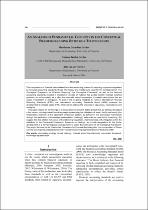 ResearchSpace
ResearchSpace
An analysis of fundamental concepts in the conceptual framework using ontology technologies
JavaScript is disabled for your browser. Some features of this site may not work without it.
- ResearchSpace
- →
- Research Publications/Outputs
- →
- Journal Articles
- →
- View Item
| dc.contributor.author |
Gerber, MC

|
|
| dc.contributor.author |
Gerber, AJ

|
|
| dc.contributor.author |
Gerber, A

|
|
| dc.date.accessioned | 2014-10-14T08:30:43Z | |
| dc.date.available | 2014-10-14T08:30:43Z | |
| dc.date.issued | 2014 | |
| dc.identifier.citation | Gerber, M.C, Gerber, A.J and Van der Merwe, A. 2014. An analysis of fundamental concepts in the conceptual framework using ontology technologies. South African Journal of Economic and Management Sciences, vol. 17(4), pp 396-411 | en_US |
| dc.identifier.issn | 2222-3436 | |
| dc.identifier.uri | http://www.sajems.org/index.php/sajems/article/view/525/434 | |
| dc.identifier.uri | http://hdl.handle.net/10204/7722 | |
| dc.description | Copyright: 2014 University of Pretoria. The definitive version is published in South African Journal of Economic and Management Sciences, vol. 17(4), pp 396-411 | en_US |
| dc.description.abstract | The interpretation of financial data obtained from the accounting process for reporting purposes is regulated by financial accounting standards (FAS). The history and mechanisms used for the development of 'The Conceptual Framework for Financial Reporting’ (the Conceptual Framework) as well as the financial accounting standards resulted in impressive volumes of material that guides modern financial reporting practices, but unfortunately, as is often the case with textual manuscripts, it contains descriptions that are vague, inconsistent or ambiguous. As part of the on-going initiatives to improve International Financial Reporting Standards (IFRS), the International Accounting Standards Board (IASB) promotes the development of principle-based IFRS, which aim to address the problems of vagueness, inconsistency and ambiguity. This paper reports on the findings of a design science research (DSR) project that, as artefact, developed a first version ontology-based formal language representing the definitions of asset, liability and equity (the fundamental elements of the statement of financial position as defined in the Conceptual Framework) through the application of knowledge representation (ontology) techniques as used within computing. We suggest that this artefact may assist with addressing vagueness, inconsistencies and ambiguities within the definitions of the Conceptual Framework. Based on our findings, we include suggestions for the further development of a formal language and approach to assist the formulation of the Conceptual Framework. The project focuses on the Conceptual Framework for Financial Reporting after the incorporation of Phase A in the convergence project between the Financial Accounting Standards Board (FASB) and IASB. | en_US |
| dc.language.iso | en | en_US |
| dc.publisher | University of Pretoria | en_US |
| dc.relation.ispartofseries | Workflow;13512 | |
| dc.subject | Accounting ontology | en_US |
| dc.subject | Formal ontology | en_US |
| dc.subject | Financial accounting standards | en_US |
| dc.subject | Conceptual framework | en_US |
| dc.subject | Knowledge representation | en_US |
| dc.title | An analysis of fundamental concepts in the conceptual framework using ontology technologies | en_US |
| dc.type | Article | en_US |
| dc.identifier.apacitation | Gerber, M., Gerber, A., & Gerber, A. (2014). An analysis of fundamental concepts in the conceptual framework using ontology technologies. http://hdl.handle.net/10204/7722 | en_ZA |
| dc.identifier.chicagocitation | Gerber, MC, AJ Gerber, and A Gerber "An analysis of fundamental concepts in the conceptual framework using ontology technologies." (2014) http://hdl.handle.net/10204/7722 | en_ZA |
| dc.identifier.vancouvercitation | Gerber M, Gerber A, Gerber A. An analysis of fundamental concepts in the conceptual framework using ontology technologies. 2014; http://hdl.handle.net/10204/7722. | en_ZA |
| dc.identifier.ris | TY - Article AU - Gerber, MC AU - Gerber, AJ AU - Gerber, A AB - The interpretation of financial data obtained from the accounting process for reporting purposes is regulated by financial accounting standards (FAS). The history and mechanisms used for the development of 'The Conceptual Framework for Financial Reporting’ (the Conceptual Framework) as well as the financial accounting standards resulted in impressive volumes of material that guides modern financial reporting practices, but unfortunately, as is often the case with textual manuscripts, it contains descriptions that are vague, inconsistent or ambiguous. As part of the on-going initiatives to improve International Financial Reporting Standards (IFRS), the International Accounting Standards Board (IASB) promotes the development of principle-based IFRS, which aim to address the problems of vagueness, inconsistency and ambiguity. This paper reports on the findings of a design science research (DSR) project that, as artefact, developed a first version ontology-based formal language representing the definitions of asset, liability and equity (the fundamental elements of the statement of financial position as defined in the Conceptual Framework) through the application of knowledge representation (ontology) techniques as used within computing. We suggest that this artefact may assist with addressing vagueness, inconsistencies and ambiguities within the definitions of the Conceptual Framework. Based on our findings, we include suggestions for the further development of a formal language and approach to assist the formulation of the Conceptual Framework. The project focuses on the Conceptual Framework for Financial Reporting after the incorporation of Phase A in the convergence project between the Financial Accounting Standards Board (FASB) and IASB. DA - 2014 DB - ResearchSpace DP - CSIR KW - Accounting ontology KW - Formal ontology KW - Financial accounting standards KW - Conceptual framework KW - Knowledge representation LK - https://researchspace.csir.co.za PY - 2014 SM - 2222-3436 T1 - An analysis of fundamental concepts in the conceptual framework using ontology technologies TI - An analysis of fundamental concepts in the conceptual framework using ontology technologies UR - http://hdl.handle.net/10204/7722 ER - | en_ZA |





